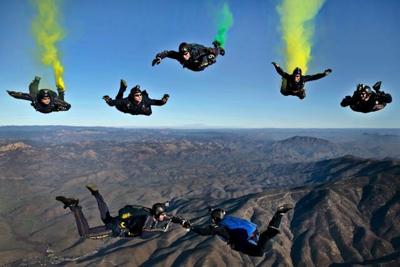Skydiving is the ultimate experience for the senses. It’s incredibly exhilarating and fun, and the best part is that you can do it indoors. Indoor skydiving lets you freefall but in a controlled environment. Signing up for one can mean more than fun and thrills, especially since you don’t have to worry about the weather.
What are the benefits of indoor skydiving?
For starters, it’s an excellent training ground before you take the plunge of skydiving. Since it simulates the freefall experience, you develop skills to ensure your comfort and safety at a certain altitude. You might even practice complicated moves mid flight.
Another benefit: indoor skydiving can help conquer your fear of heights, improving your response to stressful situations. It helps keep your brain sharp, prompting your “fight” response and developing coping mechanisms. Your confidence also soars when you conquer an extreme activity. And because this is a kind of extreme workout, skydiving does help burn calories.
So the next time you come across skydiving invitations, grab them because the activity will be good for you. You’ll want to prepare well for the day if it’s your first time.
Here is a quick guide.
What Should You Not Do Before Skydiving?
Don’t overeat or drink
You may feel like celebrating, having taken that first step to pushing your limits. So you could go drinking with your friends and have a big, late-night meal. That late-night meal could give you trouble when you hop into the tunnel. The bottom line is don’t overdo it the night before.
The same goes for heavy drinking. A hangover is a safety issue when skydiving. If the skydiving instructor suspects you’ve had a few drinks hours before, you may not be allowed to freefall into the tunnel.
Don’t stay up late
When you’re up all night, it affects your concentration. Freefalling requires all of your senses, and lack of sleep can impair your ability to stay alert.
Pay attention to the pre-flight briefing
You must know the basic body positions before hopping into the wind tunnel. Your instructor will guide you through “the arch,” the most basic body position. You’ll also learn basic hand signals that allow you to communicate during indoor skydiving. Your instructor can tell you if you need to keep your chin up to maintain a good position (i.e.., single finger point upward) or if you need to relax (i.e., thumbs out, pinky out).
Another key aspect to the pre-flight briefing is learning about safety, from wearing the safety gear to learning when to tell if you need to get out of the chamber.
Don’t worry
It’s normal to feel nervous before a skydive. If the activity is part of your company’s team building plans your anxiety may be on overdrive. You don’t want to hold up the line to the flight chamber while the rest of your co-workers hop into the tunnel.
Worrying can cause you to panic, and panicking can stop you from following instructions. And skydiving instructions keep you safe.
Should I Skydive on an Empty Stomach?
Should you avoid eating altogether if you can’t eat a heavy meal? Definitely not. Skydiving on an empty stomach is not a good idea because it aggravates a nervous stomach. You can have a light breakfast if you’re freefalling in the morning, or a healthy lunch if you’re doing it in the afternoon.
Avoid greasy food because it may make you nauseous up in the air. Dairy could also have the same effect on your stomach. As for caffeinated drinks, take them in moderation; a cup of coffee should be enough before you skydive.
Don’t forget to hydrate. You may feel lightheaded if you don’t drink enough water.
How to Calm Yourself Before an Indoor Skydive
Most people get nervous before skydiving, so feeling a little anxious is OK. You can try a few approaches to prepare yourself.
Try relaxation techniques
Meditation, yoga, and visualization are just some relaxation techniques you can use. These techniques slow your heart rate, improve your focus, and boost confidence.
Learn more about skydiving
Talk to people who have done indoor skydiving or to an experienced skydiver. Sometimes, learning more about something takes away anxieties because you’re not dealing with uncertainties.
Visit the site
Even if you’re going to skydive indoors, it would still help to see the site. You could observe how other people experience skydiving. Watch how people move forward and backward in a wind tunnel. Once you see how other people do it, you may feel confident.
Talk to your instructor
Your skydiving instructor is the best source of information, so ask away. Ask about the gear, the suits and the best position while you’re up in the air.
Brace Yourself and Enjoy
Free falling will feel scary. But once you overcome that fear and you get into skydiving, the adrenaline rush will be beneficial for your mind and body. Prepare mentally. Eat a light, healthy meal. Get enough rest the night before. And learn from your instructor.

With enough preparation, your skydiving experience will be a memorable one.


Post a comment as Guest
Report
Watch this discussion.
(0) comments
We welcome your comments
Log In
Post a comment as Guest
Keep it Clean. Please avoid obscene, vulgar, lewd, racist or sexually-oriented language.
PLEASE TURN OFF YOUR CAPS LOCK.
Don't Threaten. Threats of harming another person will not be tolerated.
Be Truthful. Don't knowingly lie about anyone or anything.
Be Nice. No racism, sexism or any sort of -ism that is degrading to another person.
Be Proactive. Use the 'Report' link on each comment to let us know of abusive posts.
Share with Us. We'd love to hear eyewitness accounts, the history behind an article.